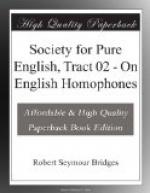ail. alms. ascent. augur (v.). barren. bate. bier. bray (pound). bridal. broach. casque. cede. cession. cite. clime. corse. cruse. dene. dun (colour). desert. fain. fallow. feign. fell (skin). flue (velu). fray (sub.). fry (small-). gait. gambol. gin (snare). gird (abuse). gore (blood). hart. horde. hue (colour). isle. lea. lessen. let (hinder). lief. main. march (boundary). meed. mien. mote. mourn. mute (of birds). neat (animal). ore. pale (enclosure). pall (v.). pen (enclose). pelt (skin). pile (hair). pink (v.). pulse (pease). quean. rail (chide). raze. reave. reck. repair (resort). rheum. rood. rue. sack (v.). sage (adj.). sallow (willow). sere. soar. spray (sprig). still (adj. n.b. keep still). stoup. surge. swift. teem. toil (snare). vane. van (fan). vail (v.). wage (war). wain. ween. whit. wight. wile. wrack. wreak. wot. aught.
[Footnote 15: Some of the words in this table are also in the last list. This list is an attempt to tabulate words falling out of use or seldom heard now in the conversation of average educated persons who talk Southern English or what is called P.S.P. (see p. 38); to some of them the word may be unknown, and if it is known, they avoid using it because it sounds to them strange or affected. It is difficult to prove that any particular word is in this condition, and the list is offered tentatively. It is made from Jones’ dictionary, which is therefore allowed to rule whether the word is obsolescent rather than obsolete: some of these seem to be truly obsolete. Some will appear to be convincing examples of obsolescence, others not; but it must be remembered that the fact of a word being still commonly heard in some district or trade (though that may seem to show that it is in ’common use’) is no evidence that it is not dying out; it is rather evidence that it was lately more living, which is the same as being obsolescent.]
4. THAT THE LOSS DUE TO HOMOPHONY THREATENS TO IMPOVERISH THE LANGUAGE.
New words are being added to the dictionary much faster than old words are passing out of use, but it is not a question of numbers nor of dictionaries. A chemist told me that if the world were packed all over with bottles as close as they could stand, he could put a different substance into each one and label it. And science is active in all her laboratories and will print her labels. If one should admit that as many as ninety-nine per cent. of these artificial names are neither literary nor social words, yet some of them are, since everything that comes into common use must have a name that is frequently spoken. Thus baik, sackereen, and mahjereen are truly new English word-sounds; and it may be,




